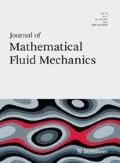Abstract
We first study the global-in-time existence of strong solutions to a one-dimensional system modeling the movement of a piston in a viscous compressible gas. Moreover, we prove the asymptotic stability of the solution toward a chosen constant state (in the sense that we can impose the final position of the piston, the final densities being fixed by the conservation of mass and the choice of the final position) thanks to a constant force acting in the equation of the point mass whose expression depends explicitly of the chosen final position. The norm of the solution in the function space of the initial data decays exponentially toward this constant state. Then, we prove the existence of weak solutions to this system for initial velocity in the energy state and for the initial density with bounded total variation. The weak solution is unique and also decay exponentially toward the chosen constant state thanks to the same constant force acting on the point mass. We use the result of existence of strong solutions to prove the existence of weak solutions, whereas the result on exponential decay of weak solution is independent of the one for the strong solutions.
Similar content being viewed by others
References
Bresch, D., Desjardins, B.: Existence of global weak solutions for a 2D viscous shallow water equations and convergence to the quasi-geostrophic model. Comm. Math. Phys. 238(1–2), 211–223 (2003)
Cîndea, N., Micu, S., Rovenţa, I., Tucsnak, M.: Particle supported control of a fluid-particle system. J. Math. Pures Appl. (9) 104(2), 311–353 (2015)
Fang, D., Zi, R., Zhang, T.: Decay estimates for isentropic compressible Navier–Stokes equations in bounded domain. J. Math. Anal. Appl. 386(2), 939–947 (2012)
Maity, D., Takahashi, T., Tucsnak, M.: Analysis of a system modelling the motion of a piston in a viscous gas. J. Math. Fluid Mech. 19, 551–579 (2017)
Shelukhin, V. V.: Stabilization of the solution of a model problem on the motion of a piston in a viscous gas. Dinamika Sploshn. Sredy, (33 Nekotorye Problemy Mat. i Mekh.):134–146, 173 (1978)
Shelukhin, V.V.: On the structure of generalized solutions of the one-dimensional equations of a polytropic viscous gas. Prikl. Mat. Mekh. 48(6), 912–920 (1984)
Yanagi, S.: Asymptotic stability of the solutions to a full one-dimensional system of heat-conductive, reactive, compressible viscous gas. Jpn. J. Indust. Appl. Math. 15(3), 423–442 (1998)
Acknowledgements
The author would like to thank his former post-doctoral advisor and former collegue Marius Tucsnak for many interesting discussions about the subject of the paper (and others) as well as for his warm welcome and kind invitations at the Institut de Mathématiques de Bordeaux.
Author information
Authors and Affiliations
Corresponding author
Additional information
Communicated by M. Hieber
Publisher's Note
Springer Nature remains neutral with regard to jurisdictional claims in published maps and institutional affiliations.
Rights and permissions
About this article
Cite this article
Lequeurre, J. Weak Solutions for a System Modeling the Movement of a Piston in a Viscous Compressible Gas. J. Math. Fluid Mech. 22, 40 (2020). https://doi.org/10.1007/s00021-020-0481-y
Received:
Revised:
Accepted:
Published:
DOI: https://doi.org/10.1007/s00021-020-0481-y


